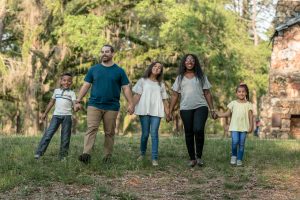By Intisar Seraaj
One thing about having a blended family—whether that’s through adoption or fostering—is that you’ll have to find a balance for almost everything, from family diet to family fun. It’s easy to include other’s cultures or religious food into a meal plan, with seafood paella on Sunday, matzo ball soup on Monday, and tajine on Tuesday. And it will probably be viewed positively when exposing your family to various types of fun activities they haven’t experienced before. But it’s more difficult creating a balanced and inclusive holiday season for blended families, especially if some of those traditions are contradictory. So, here are some tips for creating an inclusive holiday experience everyone in your blended family can be happy with.
- Remember, “raising mentally and spiritually healthy children are more about thoughtful parenting and communication than it is about avoiding complexity.” This is probably going to be an intricate task and it will take delicacy. You can minimize some of the difficulty by being sensitive to your child(ren)’s heritage and effectively communicating with each other about what makes you each happy, what are your holiday expectations, and why these traditions are important to you or for your religion, culture and/or heritage. “Knowing what to expect will help to decrease anxiety and avoiding surprises will decrease tensions.” Here are some questions you may want to ask:
- Will there be visitors? Will you go on visits to the homes of family and friends?
- What is the attire?
- Will there be gifts exchanged?
- What special customs will be observed?
- What preparations need to be done in advanced?
- Honor the child’s birth heritage, or religion or cultural practices they’ve decided to practice, along with whatever celebrations your family has decided to have. Even if the child doesn’t know everything about their birth family’s heritage, this is an opportunity to learn alongside them. Even if they don’t have holiday traditions, this is a chance to ask them what would make holidays special for them, then implement a new tradition unique to your blended family. Even outside of the popularized fall holidays like Thanksgiving, Hanukkah and Christmas, ask your blended family members what days during the year are special for them to celebrate. Especially for those with adopted and foster children, this is something you should ask your child when you initially receive them. This will make them feel special, give them a sense of permanency, and they won’t be feeling down and subconsciously waiting to go to their next home.
- Think before you act and think about things from their perspective. Not that you’d be tempted to do or say these things, but ask yourself these rhetorical questions, so you remember to be sensitive:
- What would you do if your foster/adopted child refused to attend your place of worship?
- What if your foster/adopted child attempted to convert you?
- What if your child(ren)’s birth parents talked badly about your religion to their children?
-
Facilitate visits and communication with your child(ren)’s loved ones. Make some time for your child(ren) to be connected to their birth family or old friends, so they can feel connected to their past and traditions. If their birth family is not nearby or in a good mental or financial space to be visited, then at least facilitate a phone call or video chat.
- Remember confidentiality and set boundaries. If your child(ren)’s holiday traditions are different than yours and what your guests are accustomed to, there might be a lot of questions. Prepare you and your child(ren) to answer these questions appropriately in a way that doesn’t make them uncomfortable, break HIPPA laws, insult anyone, or cross their personal boundaries.
The holidays aren’t just for happiness and joy, but they’re also a time for remembering, giving, and gratitude. Even with these tips and all your effort, sometimes, your foster/adopted child(ren) might want to withdraw. While encouraging them to celebrate with you, teach you about their heritage and make new traditions, also allow them to have some space for reflection and processing grief. These tips aren’t a cure-all for every situation but take them into consideration and hopefully, you’ll have a happy holiday season with your blended family.




